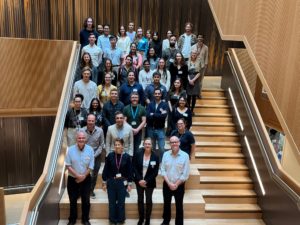Parkinson’s disease is the second most common neurodegenerative disease after Alzheimer’s disease. It develops when dopamine-secreting neurons in the brain die. It is still unclear why and what causes these neurons to die. An international research team consisting of five working groups now wants to find out what role neuronal calcium metabolism plays in this process. The interdisciplinary joint project is funded by the British science foundation “Wellcome Trust” with a “Collaborative Award” of around five million euros; it is headed by Professor Richard Wade-Martin from the University of Oxford. Professor Birgit Liss from the University of Ulm is also involved, receiving more than 500,000 euros for her subproject.
The neurotransmitter dopamine plays a key role in the transmission of nerve signals. If dopamine is missing in the brain, the transmission of nerve impulses to muscle cells, among other things, is disturbed, as is the case with Parkinson’s disease. The consequences: Mobility and dexterity are lost, muscle stiffness and rest tremor occur, and sufferers have trouble initiating movements. But what makes these dopamine-secreting neurons so sensitive and vulnerable that they perish in Parkinson’s disease?
“It is now known that certain dopamine-secreting neurons are particularly vulnerable, located in a specific region of the brainstem: the so-called black matter. We now want to find out why this is so,” explains Professor Richard Wade-Martin of the Oxford Parkinson’s Disease Centre (OPDC). The British researcher is coordinating the research project “Compartmentalised calcium handling in dopamine neurons”, which is funded by the Wellcome Trust with a “Collaborative Award in Science” worth 3.8 million British pounds. The researchers want to understand in detail how exactly calcium enters these neurons and how it controls dopamine release and other processes there. Different areas of the cell will be studied separately, as the cell body and cell processes appear to differ greatly in this regard.
“Calcium is essential for generating electrical and chemical signals that are important for releasing dopamine, for example. On the other hand, calcium is also known to induce stress and even cell death. It is therefore important that calcium metabolism is well balanced and does not get out of hand even under stress, because the dopamine-releasing cells are particularly sensitive to such disturbances,” says Professor Birgit Liss. The head of the Institute of Applied Physiology at the University of Ulm has been a Visiting Fellow and Visiting Professor at the University of Oxford (Linacre and New College) since 2019, and co-applicant for this research project.
The international research team, working with both mouse models and human stem cells, aims to understand why dopamine-secreting cells are so sensitive to perturbations in calcium metabolism and other stressors. This may also provide ways to make these neurons more resistant. The interdisciplinary collaborative project brings together the work of five research groups from the University of Oxford, University College London and the University of Ulm. They are led by Professors Richard Wade-Martin (coordinator), Stephanie Cragg, Peter Magill, Josef Kittler and Birgit Liss.
Liss will use the funding for the Ulm subproject to finance doctoral and postdoctoral positions. At the kick-off meeting in Oxford at the beginning of September, two of her junior researchers were already involved. In addition to presenting posters and talks, the main goal was to establish contact with the other participating research groups. “A research project that is located at different sites in different countries thrives on the exchange and personal contact of all scientists involved. In this way, joint experiments can be optimally planned and expertise exchanged,” says the Ulm Parkinson’s expert.

